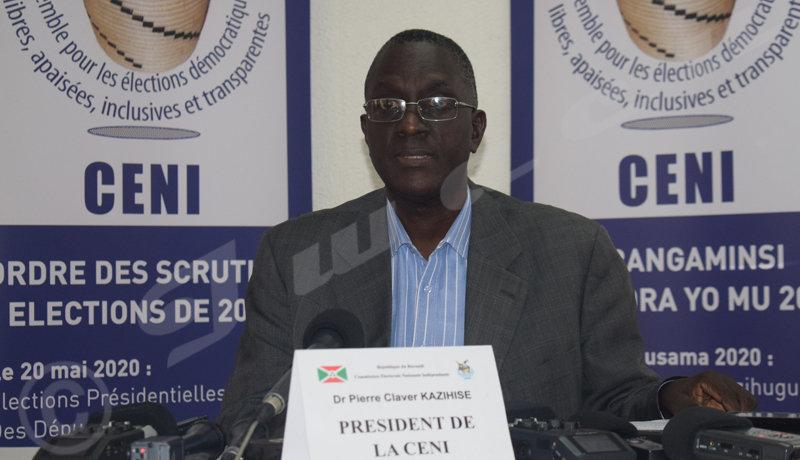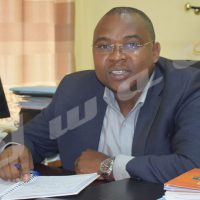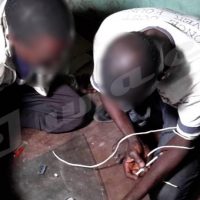On Tuesday, March 10, the National Independent Electoral Commission announced that it had rejected four files of presidential candidates. The concerned candidates expressed their frustration and said they were going to appeal to the Constitutional Court.
 Jacques Bigirimana of FNL party, Anicet Niyonkuru of CDP, Valentin Kavakure of FPN-Imboneza and Domitien Ndayizeye of Kira-Burundi coalition are the presidential candidates whose files have been rejected by the National Independent Electoral Commission-CENI.
Jacques Bigirimana of FNL party, Anicet Niyonkuru of CDP, Valentin Kavakure of FPN-Imboneza and Domitien Ndayizeye of Kira-Burundi coalition are the presidential candidates whose files have been rejected by the National Independent Electoral Commission-CENI.
The announcement was made by Pierre-Claver Kazihise, chairman of the commission, at a press conference held on Tuesday, March 10.
He has said that the files which have not been accepted do not meet the requirements of the Constitution and the Electoral Code. He said all the submitted files were analyzed on basis of the provisions of these two texts.
However, Mr. Kazihise has said that the candidates whose applications could not be accepted by the CENI have the right to appeal to the Constitutional Court within two days as the Electoral Code stipulates.
Shock and confusion among the four rejected candidates
The inconsistent nationality declaration, the number of sponsorships lower than the required number, incomplete sponsorship files and suspicious signatures on certain documents are the criticisms made by the CENI in relation to the candidate presented by FNP–Imboneza party for the 2020 presidential election.
Valentin Kavakure, the candidate presented by this party, says it is shocking for him to hear that he does not meet the requirements when the National Electoral Commission had given him a receipt attesting that the file submitted was complete. According to him, this rejection would be hiding political motives.
“Despite the fact that we are a new party, FPN -Imboneza is a serious contender among the political parties that are in the race.” He declares that his party will appeal to the Constitutional Court.
However, Valentin Kavakure said that he has no intention of giving up even if his file as a presidential candidate was rejected.
“The announcement fell while we were preparing to deposit the guarantees of our candidates for the legislative elections,” he added.
For his part, Domitien Ndayizeye, former Head of State and candidate of Kira-Burundi Coalition for the May presidential election, says he was surprised by the verdict of the CENI. According to him, the commission advanced incomplete sponsorship files as a reason for refusal.
Mr. Ndayizeye says that he will first go to the CENI before appealing to check if the sponsorship files he has submitted have not been either interchanged or removed.
Anicet Niyonkuru, candidate of the Council of Patriots (CDP) who was also ruled out for ” incomplete sponsorship files ”, hopes that the Constitutional court will cancel the CENI’s decision: “We have got two months to work since we have returned to the country! This should be encouraged instead of being discouraged. These are small flaws which should not, in any case, block us in our political progress.”
As for Jacques Bigirimana, the FNL candidate, he argues that the shortcomings identified by the CENI to not approve his candidacy are unfounded. “It is a case of some certificates of residence of sponsors which do not conform to their criminal record certificates and the ethnicity of the sponsors which is not specified on the list that we have given to the CENI.”
Regarding the specification of the ethnicity of the sponsors of his party, Jacques Bigirimana has said that this rule is not provided for in the provisions of the CENI chaired by Mr Kazihise.
“We could not mention what was not recommended by the CENI on the forms,” said the president of FNL party.
Mr Bigirimana also explained himself on the ambiguity of the residence certificates obtained by some of his sponsors: “We have been constantly informing the Ministry of the Interior that a lot of communal administrators didn’t make it easy for us to get certain documents. Thus, to get their residence certificates, some of my sponsors have been obliged to have recourse to administrative officials from municipalities other than those where they live.”
According to him, even though the constitutional Court would not rule in his favor, his party does not intend to withdraw from the elections.
False applications
The candidate Valentin Kavakure presented a number of sponsorships lower than the number required by the electoral code (200). In this case, why the commission chaired by Pierre-Claver Kazihise waited seven days to speak of a flaw which could, in principle, have resulted in the inadmissibility of the file of the candidate of FPN-Imboneza party?
At the end of the press conference he held this Wednesday, March 11, Jacques Bigirimana, candidate of FNL party, complained that the CENI had selected his application on the basis of the list of sponsorships without making mention of the gender and ethnicity of their sponsorship supporters.
But the Electoral Code is quite explicit on this point in Article 97. “Every presidential candidate must be sponsored by a group of two hundred people chosen after taking into account the ethnic groups and gender. This group must have a national dimension.’
Jacques Bigirimana says the Electoral Commission raises the ethnic diversity of sponsorship supporters, but nowhere has it specified that the ethnicity of the sponsors must appear on the list that we have given it!
Mr Bigirimana adds that some of his sponsorship supporters obtained their certificates of residence outside the municipalities where they live! The municipal administrators would have obstructed access to certain documents to the candidate’s sponsors. This does not hold for some given that the candidates from other parties running for president, including opposition parties like CNL, obviously did not have this problem. This rather hides a lack of organization of the party rather than an administrative maneuver targeting the latter.
Fool’s game
The candidates whose files were rejected belong to all groups; the pro-government camp (Jacques Bigirimana) is as much represented on the list of rejected candidacy files as the opposition camp. Ditto for the accepted files where CNL and Sahwanya-FRODEBU parties appear (Fierce opponents to the CNDD-FDD).
With this observation, the Independent National Electoral Commission cannot be suspected of favoritism. So, why some candidates (Valentin Kavakure) whose files were refused dared to denounce political motives behind the decision of the CENI?
Would the Commission be so clumsy as to exclude political parties without any popular basis and accept those embodying a real electoral challenge to the ruling party like the CNL led by Agathon Rwasa?
The reason advanced by the candidate Kavakure may lie elsewhere: The fear of running for president with a fundamental obstacle: Shortage of funds to engage in an electoral race which requires colossal sums.
Would he have declared his candidacy and then advance a conspiracy on the part of the CENI to have the pretext of withdrawing his candidacy knowing of course that the constitutional court would not go against the verdict of the electoral commission?
Some believe that having mentioned “Former presidential candidate “on his Curriculum Vitae is very advantageous even if it means submitting fake candidacies and engaging in a game of fools with the public.
Story written by Alphonse Yikeze and translated into English
by Pierre Emmanuel Ngendakumana
















 IWACU Open Data
IWACU Open Data

